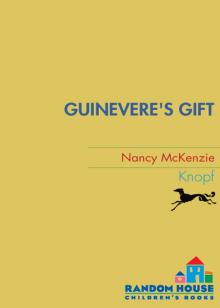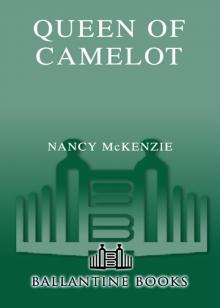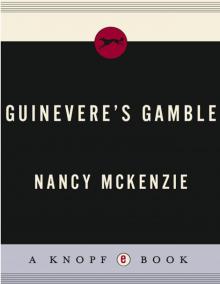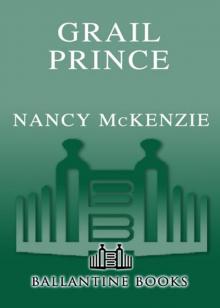- Home
- Nancy McKenzie
Grail Prince Page 31
Grail Prince Read online
Page 31
“You exiled him so I couldn’t take my vengeance!”
“I’ve made you King of Lothian and Orkney. Go take charge of your inheritance. Tonight.”
“I know what you’re doing, Arthur! I see right through you! You’re trying to keep me from getting at him.”
Arthur smiled bitterly. “You might say I’m trying to spare your life.” Gawaine waved a fist before the High King’s face. “Oh, I’ll kill him. This is one battle I will win. One day I’ll kill him, even if no one is looking but me.”
Arthur shrugged. “That’s as may be. But you won’t kill him tonight. Now go.”
“Let me have my brother’s sword.”
“No.” Arthur’s voice was sharp. “It’s not your gift. Lancelot gave it to him. I’ll dispose of it as I judge best.”
“But—”
“Enough. I’ve had enough of killing for one night. You are dismissed.” Gawaine paused, scowling, and then nodded curtly. “My lord King.” He strode out.
“Galahad,” the woman whispered. “Can you see straight? Can you speak?”
He looked up, his temples throbbing. Her white-gold hair was spattered with blood, but she seemed unharmed. The blood must belong to someone else. Even her pallor looked lovely in candlelight. Her beautiful eyes searched his as her trembling warmth enclosed his fear, soothed him, held him safe in the sanctuary of her affection. He fought a strong desire to lie back in her arms.
“Go away!” he whispered fiercely. “Leave me alone.”
The King reached down, raised her, and took her in his arms. “He will be all right, Gwen,” he said in a low voice. “Let me speak with him awhile. Go and see to Mordred. He’s been asking after you.”
“He’s been weeping, Arthur. He must have cried himself to sleep before Gawaine came in. And he’s wet to the skin. He needs a fire.”
The King touched his lips to her cheek. “He’s a strong boy. He’ll live.”
She nodded, managing a smile, kissed him quickly, and left them alone together.
Arthur lifted Galahad, wrapped him in Gareth’s cloak, and sat him on the bed. He reached for his traveling flask and poured a dark liquor into the horn cup on Gareth’s table. “Drink this.” It was a command. Galahad drank. Somehow the fiery liquid got down his throat. He coughed, and found that he could speak.
“My lord, Gareth’s not dead?” His voice shook. “It’s not true, is it? It can’t be!”
Arthur walked to the window and stood with his back turned. When he spoke, his voice was low and heavy. “It is an old, old story, Galahad. Envy, greed, ambition, distrust, and betrayal. Everyone has lost. No one has won. My fellowship of knights is torn asunder. If the kingdom itself survives this night’s work, I shall count myself lucky.”
“It can’t be true!”
Arthur turned. “Tonight your father, my dearest friend and my companion of twenty years, was attacked by my own nephews. My own nephews and six others. All of them drunken fools who put more faith in gossip and rumor than in men.” The King’s eyes blazed. “He was alone and unarmed when they attacked him. And he killed them all.”
Galahad trembled. “He was alone?”
“I meant he was the only warrior. He was in the Queen’s chamber. But he had no sword, and neither had she.”
Galahad stared unbelieving at the King.
Arthur’s face hardened until it looked like stone. “You too, Galahad? I thought you knew your father better.” His voice was cold. “The Queen sent for him in haste. She had received a message from a courier at a late hour. It was my message. I sent the courier. You saw me do it.” He paused. “I commanded her to send privately for Lancelot and Mordred, to tell them Constantine was reported moving toward Camelot with troops. Secrecy was important because Constantine has spies in my household. I did not want anyone but these three—whom I would trust with my life—to know I’d be home tonight.” He passed a weary hand across his face. “She was well attended. Three of her women were in the room. And Lancelot brought Gareth.” Their eyes met. Arthur was the first to look away. “What happened only happened because fools believed the talk about them.”
“But . . . Gareth . . . Gawaine said . . .” He could not finish. Arthur sighed heavily and came and sat beside him on the bed.
“Imagine yourself, Galahad, unarmed, set upon by eight drunken ruffians. You are sworn to protect the Queen, you have sworn that oath to me, and these men have burst into her chamber, waving swords, which is treason. How do you suppose he killed them all?”
“I don’t know.”
“I do. He went into a rage. He went mad. I have seen him so in battle. I have seen Saxons flee who only looked into his face. Soldiers call it blood lust. He doesn’t know who or where he is. He simply kills everything that moves.” Arthur’s voice grew quiet. “That’s just how the Queen described it, and she was there. She saw it all. . . . When the last sword fell, he stopped, but he did not know what he had done. Imagine his horror when he found that, in addition to his attackers, he had killed Gareth and knocked Mordred senseless, although they had each come to his aid. But in his fever he knew them not.”
“My father killed Gareth?” The King put an arm around him. “My father? How could he? I’ll . . . I’ll . . . I’ll kill him for it!”
“You don’t mean that. And it is not in your power to inflict a worse punishment upon him than he will, every day, every night, for as long he lives, inflict upon himself. Gareth’s death will lie upon his soul forever. He has loved Gareth as a son since the day the boy came to Camelot—he would sooner have killed himself than kill Gareth. But he did not know what he was doing.”
Galahad sobbed wildly against the King’s chest. Arthur kept talking in a quiet, steady voice. “And poor Linet saw it happen. She was one of the Queen’s attendants. Ah, God, but this is a black day for Britain! We are divided now and I fear we shall never be whole. Gawaine has sworn to kill Lancelot—not for Agravaine or Gaheris; they were doomed by treason as soon as they entered the Queen’s chamber—but for Gareth. Gareth’s death is just cause for vengeance and I cannot deny him his right. I can only hope to keep them apart as long as I can.” He stroked Galahad’s hair. “And Mordred, who took a sword in the shoulder, has cause for vengeance, too. He followed his Orkney brothers to the castle, and when he saw what they intended, went to fetch the house guard. He feared for the Queen’s life. He did not think Lancelot could defend against them all.” He paused. “But he will not seek vengeance. He told me what the Queen has told me. Lancelot saw only the sword before his face, not the man behind it. For my sake, for her sake, and for Britain’s, he will not hold Lancelot to account.”
Arthur looked down at Galahad. The boy’s face was puffed with weeping and his eyes swollen half-shut. “Come, Galahad, put away your tears. It is time now to be a man. Gareth is with God; he does not share your grief. Your father escaped death tonight, and he saved the Queen’s life. For that alone I forgive him all his other sins.” He paused. “But you do see, don’t you, that I had to exile him? For his own good, I have sent him back to Lanascol. We who are left, you and I and Guinevere and Mordred, we must see that his name is not blackened here in Britain. For Gawaine’s tongue will not be idle long.”
He rose and in the shadow of the door picked up a swordbelt and scabbard. “And we must bury Gareth with honor.” Galahad’s sobs subsided to hiccups but his breaths still came in gasps. The King came toward him, drew the sword, and held it flat across his palms. It was the same sword Galahad had seen on Gareth’s hip a thousand times. The hilt was inlaid with blue enamel in the shape of twined sea serpents, as on the badge of Orkney, and down the blade ran Latin letters: For the glory of God, the glory of Britain, the glory of Arthur.
“This is Gareth’s sword. I remember the day Lancelot gave it to him.” Arthur smiled sadly. “He was only ten, but worth any two of his brothers in loyalty, piety, sense, and kindness. His brothers went out of their way to make him feel small and useless. It was Lancelot who saw his heart
and knew him to be noble.” He held out the sword to Galahad. “I give it to you. You were more a brother to Gareth than any who shared his blood. It is fitting you should have it. You are nearly eleven, aren’t you?”
“No, my lord,” Galahad said in a small voice. “I’m nine.”
“Nine!” The King smiled. “Imagine my forgetting! I beg your pardon. Nevertheless, you are ready for it. You are nobly born and nobly raised; in your heart you serve the light.”
Galahad accepted the sword gingerly. “I will do my best,” he whispered, staring at the weapon.
Arthur raised an eyebrow. “You have promised me service, do you remember? It would give me great pleasure to see you wield that sword for me.” He turned and looked out at the dark, howling night. “What we need,” he said slowly, “is a good clean fight out in the open air, a bloody battle to cleanse our souls. It is the cure for jealousy and rank ambition, for boredom and the restlessness bred of peace. Let us face a foe of merit, an enemy so deadly we quake to meet him, and we will all stand together. Then we Britons will regard ourselves as brothers once again, and put away petty quarrels to save our skins.” He rested a hand on Galahad’s shoulder. “What we need,” said the King, “is a war.”
BOOK TWO
PART I
Fields of Battle
In the twenty-sixth year of the reign of Arthur Pendragon
26
THE LANDING
An hour before sunset the first of Arthur’s ships rowed into the Breton harbor on a sea as smooth as glass. A great crowd of men thronged at the wharfside, jostling for position, horses sidling, banners held aloft, shout⸍ ing welcomes.
“Arthur! Arthur! Arthur of Britain!”
Galahad stood at the rail well aft of the group clustered around the King. He had not seen Breton soil since that awful journey, five years ago, which had ended in Gareth’s death and Lancelot’s banishment. He scanned the crowds for the banners of the men he knew. In the failing light he picked out the Black Boar of Brittany over King Hoel’s men. He doubted that ancient warrior was there himself—they were probably led by Riderch, Hoel’s eldest son, a man older than Arthur and still only a prince. And there . . . there was the one he looked for, the Hawk of Lanascol lifting proudly in the evening breeze. He leaned forward, searching intently for the face he dreaded seeing. But it was his uncle Galahantyn who led the Lanascol contingent. He waved, but Galyn’s attention was on the High King and he did not notice.
The ship sidled up to the wharf; the great hawsers were swung down and secured. Men and horses shuffled into position as the procession ashore began. Arthur led, with Mordred and Gawaine at his heels, and then the Companions and the kings and princes of Britain with all their trains. After a short ceremony of formal greeting, which Galahad was too far away to hear, the High King was given a horse and rode slowly away with Prince Riderch, the massed troops following in an orderly march out of town.
The full unloading of the ship would take half the night. Men and horses on the following ships would not come ashore till morning. The army, once encamped, could not move off toward Kerrec for three days at least. There was plenty of time. But Galahad hurried ashore, jostled this way and that by soldiers, pages, and servants, badgered by merchants with trays of goods to sell: sweetmeats, trinkets, copper armbands, cheap daggers for the unwary, charms and talismans of victory for the superstitious, tankards of ale for the thirsty, and every sort of worked leather from sandal straps and bootlaces to scabbards and thick gloves. He fought through the crowd to where the men of Lanascol had been.
They were no longer there. He was alone in the bustling throng where Galyn had stood only twenty minutes past. They hadn’t waited for him. Slowly he retraced his steps along the wharfside, following hundreds of others in a dusty procession out of town. Probably they thought Arthur had left him home. What use, after all, could he be? He was just fourteen, a full year too young for the army. In the coming glorious battle he could take no part.
“Galahad! There you are, at last!” He spun around as a long arm caught his shoulders and drew him into a warm embrace.
“Uncle Galyn!”
“Where have you been, lad? I looked for you everywhere. I was beginning to think you had not come. And if I hadn’t seen your badge I’d not have known you. You’ll be my height in another year, by God! Come and sup with us, won’t you? We are camped up on the hill behind the town. The High King’s tent will be near enough. And we want to hear your news.”
“And I yours. King Arthur tells me I have another cousin. Congratulations.”
Galyn laughed. “Three girls now, each one as pretty as their mother. They want to see you, Galahad, and so do your brothers. I hope you’ll stop at Benoic if you get the chance.”
Galahad avoided his eyes. “That depends. Who is with you, Uncle?”
“Bors and Cordovic, Menaduke with all his sons, young Hebes— though he’s not half the swordsman you are—Lavayne, Nirovar, Sadok, Palomides and his brother Saffir, even old Selysus—”
“You’ve named every lord in Lanascol! Who is left to hold Benoic?” Galyn grinned. “Your aunt Adele. Why do you frown so? She is as able as I am, except in warfare. Lancelot chose her himself and does me great honor by it. Don’t worry, Clarres leads the house guard. He is loyal.”
“You know Aunt Adele is dear to me,” Galahad murmured. “It’s not that. But . . . it’s utter foolishness to let a woman rule a kingdom!”
Galyn looked amused. “Your own mother did not think so. Don’t be so stiff-necked, boy. Arthur left Guinevere regent in Britain—what say you to that?”
“I’m not the only one who thinks it a mistake.”
In the long May dusk they passed the wharfside warehouses and the inns with their doors flung open. Welcome scents of roasting meat hung in clouds above the dusty street; snatches of soldiers’ songs drifted out to them as they trudged by, in step but silent. Galahad’s stomach growled audibly. Beyond the wooden palisade that marked the village boundary they found themselves walking alone together, with no one near enough to overhear.
“You haven’t yet asked after your father.”
“I saw he wasn’t here.”
“He’s in Kerrec with King Hoel. He wanted to leave me there and come himself to greet you and Arthur, but . . .”
“He knows Gawaine travels with the King,” Galahad finished, “and he didn’t want to chance that meeting in a wharfside village.”
“Don’t be absurd!” Galyn snapped. “You can’t think he fears Gawaine!” Galahad shrugged. “All of Britain is waiting to see that meeting. I know plenty of soldiers who’ve had bets laid on for years.”
Galyn flushed. “That’s not the reason he stayed away. You can’t think so little of him. You, his own son.”
“Can’t I?” Galahad’s face darkened. He kept his eyes on the ground.
“You still cannot forgive him? Five years is a long time.”
“Gareth still lies in a bed of dirt.”
“You honor him with your mourning, Galahad. But it is time for that to pass.”
“Let’s talk about something else. Please.”
After a long moment Galyn nodded. “Tell me about the crossing, then. Had you good weather? How many men has Arthur been able to raise? The courier said ten thousand, but that number is beyond belief.”
“Twelve thousand,” Galahad said proudly. “Every able-bodied man in Britain answered his call.”
“Twelve thousand! This is wonderful news! What with the men of Lanascol, Hoel’s army, and King Childebert’s men, we will be nearly twenty thousand strong! No one dared hope for so many.”
“King Childebert! Must we fight with Franks? They have been our enemies so long.”
“Not since old Clovis died. Childebert’s a man who values peace. He soon saw sense in making an alliance with Hoel and Lancelot. And now that trouble has arisen”—Galyn hawked, turned, and spat—“he is doubly glad. Who would have thought that Rome would ever be our enemy again!”
<
br /> “I thought the emperor asked only for tribute.”
Galyn clapped a hand on his shoulder. “An old ploy, weakly veiled. The demand for tribute sent to Hoel and Childebert and Lancelot is more than any of them could ever pay. Rome knows it. And whom does she send to collect it? General Hiberius himself! It’s clear enough: We must fight, or we must surrender. There is no middle ground.”
“Then this war is with Rome? I thought we came to fight the Burgundians.”
“We’re fighting both. Burgundians are nothing but Rome’s lackeys. Dogsbodies. Boot-licking catamites. At Rome’s instigation, they attack us. If we pay the tribute, Rome will call them off.”
“Are the Romans afraid to challenge us directly?”
“Aye, that’s what your father thinks. It might be a war unpopular at home. Lancelot also thinks they might be shy of attacking Arthur outright. They know well he has never been beaten.”
Galahad nodded gravely. “The Unconquered King.”
Galyn grinned. “So is he known even among the consuls of Rome.”
“The Franks have always been stiff-necked and proud. Will they acknowledge his command?”
“Aye, that is already settled. When we get to Kerrec he will be formally proclaimed chief commander. Then it is up to Arthur to win the respect of Frankish troops.”
“Give him a week; they will follow him to the ends of the earth.”
Galyn laughed with pleasure, and ruffled the boy’s hair. “Well done! Spoken like a son of Lancelot! Thank God for the time you live in, that you have known such a man. When he is gone, we will not see his like again.”
“Not propitious words, Uncle Galyn, when in a month we go to war.”
“Well, well, with any luck, this war will come to nothing or be over by the solstice, and you can pass the summer with us in Benoic before returning.”
“Not,” Galahad said slowly, “if my father is there.”
Galyn’s hand slipped from his shoulder. They walked a while in silence. When Galyn spoke at last, his voice was low and sad.

 Guinevere's Gift
Guinevere's Gift Queen of Camelot
Queen of Camelot Guinevere's Gamble
Guinevere's Gamble Grail Prince
Grail Prince Prince of Dreams
Prince of Dreams